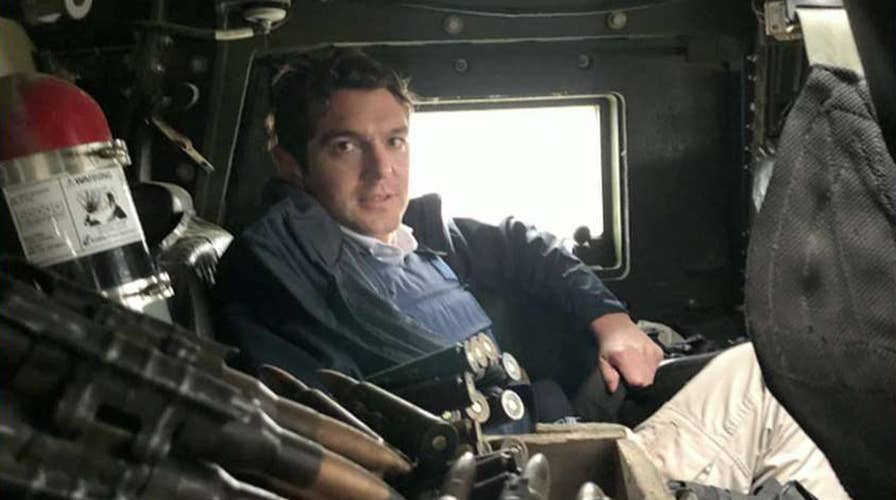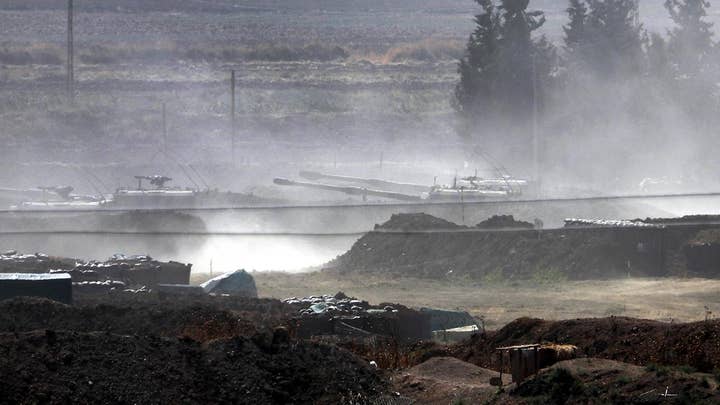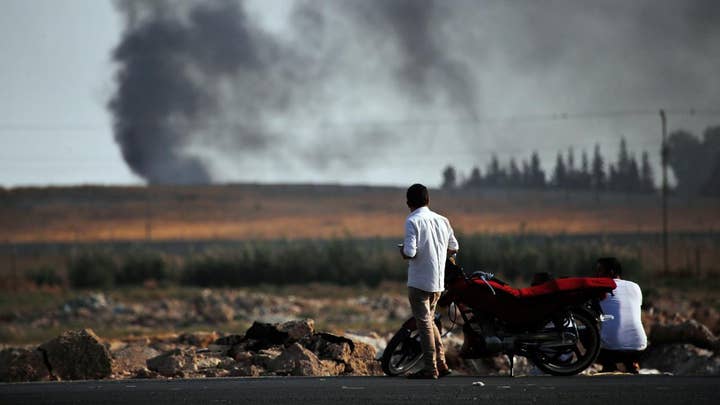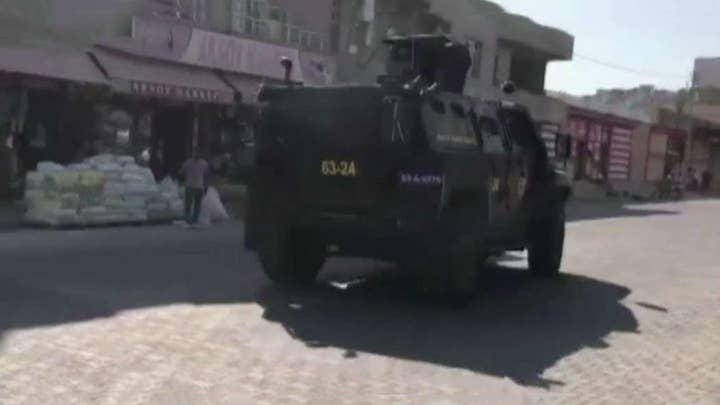Benjamin Hall recounts Kurdish fighters' push against final ISIS stronghold
Fox News' Benjamin Hall was embedded with Kurdish fighters as the ISIS caliphate fell.
Fox News was embedded with Kurdish fighters of the Syrian Democratic Forces (SDF) in Syria back in March. It was the final days of the Islamic State caliphate deep in the country’s southeast, and optimism was high. As they made their final push into the last town held by ISIS, through scenes of utter destruction, the SDF tore down the black flags that flew along the way, and began to celebrate the fall of the caliphate.
It was a remarkable scene, and a remarkable victory.
It was a victory not only for the SDF, but for the world, and it was a joint effort. U.S. and Kurdish forces, together with a global coalition of partners, had obliterated the worst terror organization in modern history. It was also a new beginning – new hope for the SDF, the Syrian Kurds and stability in Eastern Syria, a region that so needed stability.
Few could have imagined then that just seven months later, Turkish President Recep Tayyip Erdogan would call those same SDF fighters “terrorists,” and that Turkish troops would aim to “neutralize” them -- while the U.S. pulled back.
It’s already clear that the invasion has been wider and deeper than imagined, aiming for whole Kurdish towns and communities., sending tens of thousands of civilians escaping to the south.
During our trips to Syria, we’ve also spent time with U.S. forces – small groups of special forces who offered training and intelligence, who worked side-by-side with the SDF to win battles. All of them talked about the strong bonds and loyalty that was forged. They talked with admiration about Kurdish bravery, their fighting ability and their sacrifice, even though underarmed and undersupplied.
Those same U.S. soldiers now have told Fox News they cannot bear the betrayal as they watch their old allies being killed. They say they’re ashamed, and they have no directives beyond tomorrow.
I’ve been on countless trips with SDF and Kurdish fighters over the last decade, embedded with them politically and militarily. They have been valued allies – not only fierce and brave, but dreaming of just one thing: building a free nation for themselves and for their culture, amid a region so full of chaos. That dream now seems to be crumbling.
The mutual victory over ISIS appeared to solidify a relationship with America that could never be destroyed, and the partnership had been very effective. The U.S. provided intelligence, artillery, air support, and a basic level of weaponry, while the SDF provided the foot soldiers, of whom at least 11,000 have died. It’s a sacrifice the SDF told me was worth making.
Worth making, they said, to protect themselves and their allies. Worth making to obliterate the cult of ISIS, and worth making because they believed this sacrifice might have led to the creation of their first homeland.
It’s important to remember that Kurds are ethnic first and religious second; they are Muslim, Christian, Jewish, Zoroastrian and many other smaller religions.
An independent, or at least autonomous, Kurdish state in northeastern Syria could have served as a geopolitical hub for the U.S. as well. It would have provided a listening post in the region, offering a military presence often needed to exert influence, not to mention providing another bulwark against rapidly increasing Iranian aggression and expansion.
It did not require many U.S. troops to secure the area. In fact, this was one of the strongest examples of how U.S. foreign policy can be achieved with a limited number of U.S. forces -- in this case, somewhere between 1,000 and 2,000 -- backing a local force who would provide the troops and fight on the frontlines. Very little was required for the U.S. to maintain this stability, and although it was tragic, the number of Americans who died as a result of direct combat operations in Syria against ISIS was four.
Yes, Turkey has concerns that small elements within the Kurds are aligned with the PKK, a designated terror group, but the real threat the Kurds have posed to Turkey is political. They’re a growing political strength in areas where they traditionally were persecuted. For decades, the Turkish government has tried to obliterate Kurdish culture in southeastern Turkey, preventing them from speaking Kurdish, singing their songs, following their customs. The threat to Turkey is considered minimal.
U.S. TO MOVE ABOUT 50 ISIS FIGHTERS FROM SYRIA TO IRAQ, OFFICIALS SAY
Throughout the war against ISIS, while the SDF fought alongside the U.S. to defeat the terror group, Turkey has been accused time and time again of playing both sides – supporting groups against the Assad government, linked both to ISIS and to Al Qaeda.
The Erdogan regime also has aligned ever closer to Russia, buying Moscow's S400 air defense systems over U.S. Patriot missiles – a decision that led the U.S. to hold back F35 sales to Turkey. The point is: Turkey has worked with groups unaligned with the U.S., while the Kurdish SDF have stood resolutely by the U.S., and have remained steadfast allies.
Many analysts claimed the real reason Erdogan launched this invasion was to drum up support within his own nationalist followers propping him up in the polls, and that he sought to reclaim land that was once part of the Ottoman Empire. They also said he hoped to push millions of Syrian refugees living in Turkey back across the border.
The likelihood of ISIS prisoners escaping and setting up a resurgent terror network has been far stronger since Turkey launched its invasion. Some of these prison camps have been deep inside Syria, guarded by the SDF. With Turkey moves toward them, they likely will need to send more fighters north to protect themselves, leaving the ISIS camps under-guarded. An attempted prison break unfolded yesterday, and ISIS leader Abu Bakr al-Baghdadi has called on followers to break out.
President Trump has said that if ISIS does return, the U.S. will come back to obliterate the group. But, it’s uncertain who would work alongside them in that case. In the future, what message would this send to other groups with whom the U.S. would seek to work?
CLICK HERE TO GET THE FOX NEWS APP
The SDF will fight back against Turkey and may need to do so with the help of the Syrian government. Already there are reports that they’re looking at a deal by which the Assad regime would offer them protection. Speaking to people on the ground, they tell me they don’t want to do that – but who else can protect them now?
Either way, the Kurds who’ve spoken to me said they will not allow their families to be attacked, and they will fight alone if they have to do so. Kurds have been used to fighting an insurgency because they’ve been doing it for centuries, often hidden in the mountains. The area of land Turkey has aimed to control measured as large as some 9,000 square miles. They likely will be bogged down for years, and even with the second-largest standing army in NATO, they will become embroiled in a crippling war, making it a long and costly invasion for all sides.



